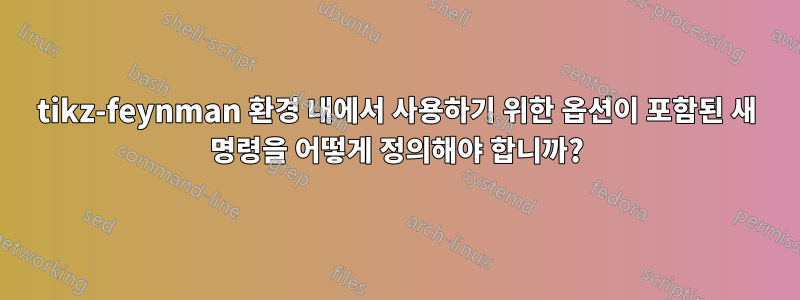
나는 다음과 같은 작업을 하고 싶습니다. 다이어그램이 있다고 가정해 보겠습니다.
\documentclass{article}
\usepackage{luatex85}
\usepackage[compat=1.1.0]{tikz-feynman}
\begin{document}
\feynmandiagram{
e1 --[momentum={[arrow distance=2mm]\(l\)}] we1;
};
\end{document}
그리고 모멘텀 키의 옵션 표현을 단순화하고 싶어서 명령을 정의했습니다.
\documentclass{article}
\usepackage{luatex85}
\usepackage[compat=1.1.0]{tikz-feynman}
\newcommand{\mom}[2]{{[arrow distance=#1]\(#2\)}}
\begin{document}
\feynmandiagram{
e1 --[momentum=\mom{2mm}{l}] we1;
};
\end{document}
원래 다이어그램을 재현하는 대신 모멘텀 레이블 l은 [arrow distance=2mm]l. 전체 표현은 tikz-feynman 패키지로 평가되지 않았으며 추진력 자체로 간주되었습니다. 이 문제를 어떻게 바로잡아야 할까요?
답변1
대신 \newcommand두 가지 인수를 허용하는 새 스타일을 정의할 수 있습니다.\tikzfeynmanset{mymomentum/.style 2 args={momentum = [arrow distance = #1] \(#2\) }}
\documentclass{article}
\usepackage{luatex85}
\usepackage[compat=1.1.0]{tikz-feynman}
\tikzfeynmanset{
mymomentum/.style 2 args={ momentum={[arrow distance=#1]\(#2\)}}
}
\begin{document}
\feynmandiagram{
e1 --[mymomentum={2mm}{l}] we1;
};
\end{document}
답변 업데이트OP의 새로운 요구 사항을 고려
\documentclass{article}
\usepackage{luatex85}
\usepackage[compat=1.1.0]{tikz-feynman}
\tikzfeynmanset{
mymomentum/.code n args={3}{
\def\tempa{#1}
\def\tempb{#2}
\def\tempc{#3}
\ifx \empty\tempa
\pgfkeysalso{momentum/arrow distance={3mm}} % default value
\else \pgfkeysalso{momentum/arrow distance={#1}}
\fi
\ifx \empty\tempb
\pgfkeysalso{momentum/arrow shorten={0.15}} % default value
\else \pgfkeysalso{momentum/arrow shorten={#2}}
\fi
\pgfkeysalso{momentum={#3}}
}}
\begin{document}
\feynmandiagram{
e1 --[mymomentum={}{}{$l$}] we1;
};
\feynmandiagram{
e1 --[mymomentum={5mm}{0.3}{$m$}] we1;
};
\end{document}


